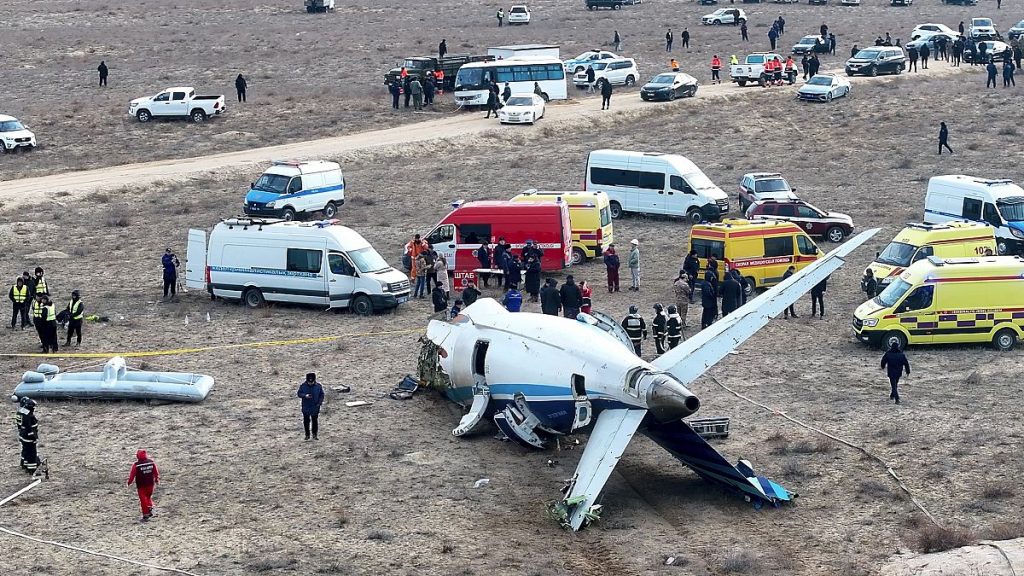The crash of Azerbaijan Airlines flight 8432, en route from Baku to Grozny, has sparked a flurry of speculation and accusations regarding the cause of the incident. While official investigations are still underway, several sources point towards a disturbing scenario involving a Russian surface-to-air missile. Azerbaijani government sources, speaking exclusively to Euronews, claim that a Russian missile, potentially fired during drone activity over Grozny, struck the aircraft mid-flight, causing damage that ultimately led to the crash. This narrative is further bolstered by the analysis of a Russian military expert, Yan Matveyev, who suggests the damage pattern on the aircraft is consistent with fragments from a missile, possibly a Pantsir S-1. He notes the presence of Ukrainian drones over Chechnya at the time of the incident, raising the possibility of a misidentification or an overzealous response by Russian air defenses.
The Azerbaijani government sources claim that, despite the pilots’ urgent requests for an emergency landing at a Russian airport, permission was denied, forcing the damaged aircraft to traverse the Caspian Sea towards Aktau, Kazakhstan. Adding to the peculiarity of the situation, these sources also allege that the plane’s GPS navigation systems were jammed throughout its flight path over the sea. This detail, if confirmed, raises serious questions about the intentions and actions of those controlling Russian airspace. The apparent unwillingness to allow the stricken aircraft to land adds a layer of mystery and intensifies suspicions regarding the initial cause of the damage.
The Kremlin, through spokesperson Dmitry Peskov, has urged caution against premature speculation, emphasizing the importance of waiting for the official investigation to conclude before drawing any conclusions. This call for restraint, however, stands in stark contrast to the emerging narrative from Azerbaijani sources and the independent military expert’s analysis. The conflicting information fuels uncertainty and underscores the need for a transparent and thorough investigation. The ongoing investigation will need to address the concerning allegations of jammed GPS systems and the reported refusal to permit an emergency landing, elements that significantly contribute to the suspicion surrounding Russia’s role in the incident.
The preliminary information suggests a tragic scenario where a commercial airliner, possibly misidentified or caught in the crossfire of a drone interception, was denied a safe landing and ultimately crashed. The incident carries chilling echoes of the downing of Malaysian Airlines flight 17 in 2014 over eastern Ukraine, an act attributed to Russian-backed forces. If confirmed, the downing of flight 8432 would mark the second time in a decade that a commercial aircraft has been destroyed by Russian forces or their allies, raising serious questions about the safety of civilian air travel in regions with active or proximate military operations involving Russia.
The investigation into the crash of Azerbaijan Airlines flight 8432 faces a complex task. It must piece together the events leading up to the disaster, confirm the cause of the damage to the aircraft, and explain the subsequent actions of Russian authorities. Determining the nature of the drone activity over Grozny, confirming the involvement of Russian air defense systems, and understanding the decision to deny the aircraft an emergency landing in Russia are crucial elements of the investigation. The findings will have significant geopolitical implications, potentially exacerbating tensions between Russia and other nations, and will undoubtedly influence future air safety protocols and international relations.
The ultimate outcome of the investigation hinges on access to crucial evidence, including flight recorder data, radar records, and communication logs. The cooperation of all involved parties, including Russia, Azerbaijan, and Kazakhstan, is essential for a comprehensive and credible investigation. The international community awaits the results with bated breath, hoping for clarity and accountability in a situation rife with suspicion and potential ramifications for regional stability and air travel safety. The specter of a second civilian airliner downed by Russian forces in recent history underscores the urgency and importance of a transparent and thorough investigation into this tragic event.

